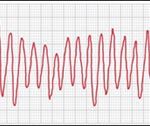 Cesium (or ceasium) chloride is promoted as a CAM cancer treatment based on the hypothesis referred to as “high pH cancer therapy.”
Cesium (or ceasium) chloride is promoted as a CAM cancer treatment based on the hypothesis referred to as “high pH cancer therapy.”
Researchers from Surrey Memorial Hospital, in British Columbia, reviewed the risk of developing a heart arrhythmia called torsades de pointes and cardiac arrest in people using this chemical as CAM treatment.
Here’s what we know.
- In addition to a patient they were treating, 10 cases of cesium-induced cardiac arrhythmias have been reported in the medical literature.
- Treatment strategies differed significantly among the patients.
- All patients recovered from the event.
The bottom line?
The authors concluded, “Complementary and alternative medicines should not be overlooked as a potential cause of serious adverse events.”
Most of our understanding of the incidence, risk factors, and drug causes of torsades de pointes come from epidemiological studies, anecdotal case reports, clinical studies during drug development, and post-marketing surveillance.
We do know that torsade de pointes is an uncommon and unique type of increased heart rhythm (tachycardia) that affects the ventricles. It differs from other forms of ventricular tachycardia by its bizarre appearance on an ECG (see above), underlying mechanism, and treatment. Recognizing torsade de pointes is important, as standard anti-arrhythmic treatments might not only be ineffective but may aggravate it.
If not recognized and treated appropriately, many people with this condition may die.
With regard to cesium, its presence in cancer cells doesn’t guarantee high pH, and there’s no evidence in patients supporting the claims that cancer cells are vulnerable to cesium.
Cesium is relatively safe. Signs of mild toxicity include gastrointestinal distress, low blood pressure, fainting, numbness, or tingling of the lips. However, total cesium intake of 6 grams/day is associated with severe low potassium and magnesium blood levels, as well as heart arrhythmias and even acute heart arrest.
Unlike the cavalier position taken by some who say “this is a cancer treatment protocol that requires little knowledgeable supervision,” the decision to use cesium to treat anything should always be done with the recognition that cesium does cause side effects. When taking higher doses cesium treatment should be supervised by a healthcare professional capable or recognizing and treating life-threatening arrhythmia.
3/25/13 11:32 JR